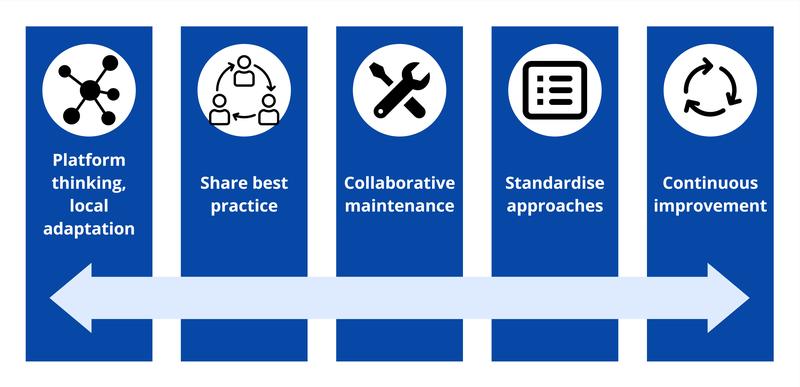Shared Infrastructure Services Programme
Shared Infrastructure Services Programme
The Shared Infrastructure Services Programme (SISP) is part of Oxford’s digital transformation, aimed at enhancing the University's IT infrastructure. The programme focuses on improving user experience, reducing complexity, and mitigating cybersecurity risks.
The programme was formed following the Infrastructure Service Review with some of the following objectives:
- Improve our user experience, thinking about how our staff and students interact with infrastructure services
- Make better use of economies of scale - not just financially but better resilience of services by sharing technologies and platforms
- Reduce complexity and improve efficiencies through sharing processes and having fewer ways of doing the same thing across divisions and departments
- Reducing our risk – particularly our cybersecurity risk through initiatives such as implementing a shared device management platform
Read the most recent programme updates:
- Shared Infrastructure Services Programme Update - Michaelmas 2025
- Shared Infrastructure Services Programme Update - Trinity 2025
Workstreams and Initiatives
The Shared Device Management Project
The Shared Device Management project is looking to revolutionise how devices are managed across the university. With many teams using tailored, local solutions, there's significant duplication and costs. This new service, built using Microsoft Intune, will create an efficient device management solution for IT teams in departments and faculties.
The service includes understanding the 'Device Management Lifecycle', providing necessary functionality, and ensuring appropriate permissions. Microsoft Intune, a cloud-based tool, has been chosen for its ability to manage and secure devices and apps across platforms. It offers benefits like consistent Single Sign-On (SSO) experience, data protection, simplified management, reduced IT workload, scalability, and cost reduction.
The SDM team publish monthly articles covering their progress and project highlights, to subscribe to these updates, sign up below:
Previous monthly Sprint updates from 2025:
- Shared Device Management - September Sprint
- Shared Device Management - July Sprint
- Shared Device Management - June Sprint
- Shared Device Management - May Sprint
- Shared Device Management - April Sprint
- Shared Device Management - March Sprint
People
The People workstream is looking at a number of initiatives including:
Shared IT Apprenticeship Scheme
This innovative pilot project aims to develop shared resources across various departments. The scheme will offer a Level 3 IT apprenticeship, providing apprentices with industry-standard IT qualifications from our approved training provider, Basingstoke ITECH.
So far, the University's Heads of Technology have approved the role, job description, and placement options for the 2-year scheme. Two apprenticeship places were assigned: Nuffield Department of Orthopaedics, Rheumatology and Musculoskeletal Sciences (NDORMS, Medical Sciences Division) and IT Services. The position was advertised in May and received an overwhelming 130 applications. Nine candidates attended an assessment day that included teamwork and presentation exercises, followed by interviews. Two outstanding candidates were selected and offered positions, with start dates in September 2025.
What's next?
The apprentices will begin with a one-week induction that includes tours, meetings, and mandatory training. They will spend six weeks on the University service desk managing calls and gaining valuable experience in IT, followed by their first placement. At the end of the first year, they will transition to a different department. The induction also provides information sessions and workshops about the university.
We anticipate that this initiative will continue next year. Departments interested in hosting an apprentice from September 2026 are invited to contact us at shared.infrastructure@admin.ox.ac.uk
ITSS induction
The Shared Infrastructure Services Programme (SISP) has identified the need for a revised ITSS induction that goes beyond a simple welcome pack. This professional development programme aims to enable new ITSS to become effective quickly, refresh and update knowledge for existing ITSS, and surface hard-to-find information about Oxford’s systems. The programme will establish a modular curriculum that can be built in stages and extended in the future, creating learning pathways relevant to specific ITSS roles
A working group comprising SISP team members and ITSS from various divisions, departments, colleges, and IT Services has been formed. They have agreed on the aims, generated an initial curriculum, and drawn up a delivery plan. Initial modules include replacements for the current online induction and introductions to Oxford IT support model, networking, SSO/MFA, and Microsoft365 collaboration tools. The group is working on the initial set of modules, expecting to publish them to ITSS in late summer, and is considering long-term maintenance to ensure they stay current
Infrastructure skills assessment
further details on this initiative will be shared in due course.
User Experience
The User Experience workstream is looking at a number of initiatives including:
Understanding and improving the ITSS experience
The ITSS Experience programme is focused on making life easier for our IT support staff by addressing gaps in knowledge, introducing new services, and updating existing ones. The team is currently rolling out the 'User Lookup tool' to help administrative staff quickly view card record details for identity and access issues. They are also working with the Identity programme to make key processes like resetting SSO and updating MFA factors more accessible. The goal is to enable IT support staff to handle more tasks directly.
Next steps include continuing to update the backlog and engaging with the ITSS community for feedback.
Further details on the below initiatives will be shared in due course.
- Sharing tasks across IT teams
- Enabling ITSS to work across affiliations
- Better access to technical and non-technical guidance
The Foundations workstream will be investigating governance and funding and further details on this will be shared in due course.

Platform thinking, local adaptation
Emphasises the importance of scalable, modular, and flexible solutions that can be adapted locally without changing the overarching platform provision. It promotes innovation, integration, and efficient service delivery across the University.
Share best practice
Divisions should actively share best practices related to managing services to enhance efficiency and effectiveness. This includes regular knowledge-sharing sessions, workshops, and documentation.
Collaborative maintenance
Teams should adopt an agile mindset and ensure the service evolves over time. New adopters are expected to contribute to the improvement of the service, promoting a sense of collaborative maintenance.
Standardise approaches
Recognising the differences within the University while understanding how processes and technologies can be standardised to promote interoperability and consistency across the organisation.
Continuous improvement
Encourages a continuous improvement mindset by enabling teams to identify areas for improvement, learn from each other, and collectively evolve the service over time.
- Pete Jones, Medical Sciences
- John Mead, Social Sciences
- Phillip Camp, Humanities
- Keith Gillow and Jeannie Scott, MPLS
- Haas Ezzet, GLAM and Continuing Education
SISP News
Events
Upcoming events:
Wednesday 3 December 14:30-15:30 Shared Device Management Show and Tell
Please email shared.infrastructure@admin.ox.ac.uk if you would like to receive the joining details for the above.




